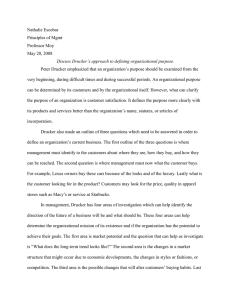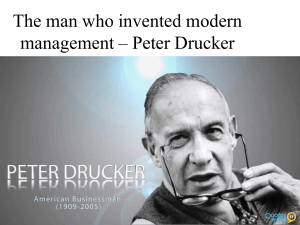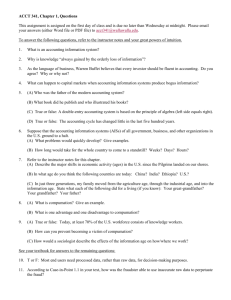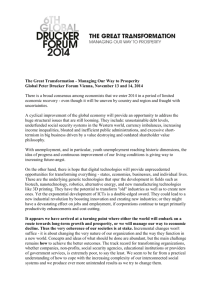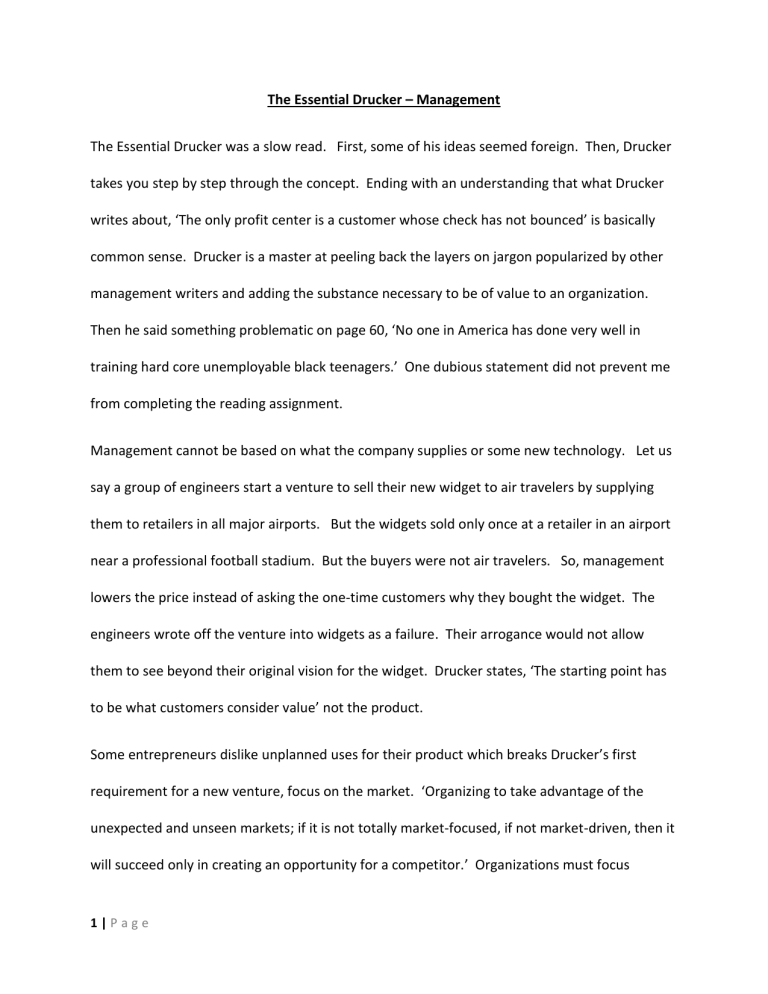
The Essential Drucker – Management The Essential Drucker was a slow read. First, some of his ideas seemed foreign. Then, Drucker takes you step by step through the concept. Ending with an understanding that what Drucker writes about, ‘The only profit center is a customer whose check has not bounced’ is basically common sense. Drucker is a master at peeling back the layers on jargon popularized by other management writers and adding the substance necessary to be of value to an organization. Then he said something problematic on page 60, ‘No one in America has done very well in training hard core unemployable black teenagers.’ One dubious statement did not prevent me from completing the reading assignment. Management cannot be based on what the company supplies or some new technology. Let us say a group of engineers start a venture to sell their new widget to air travelers by supplying them to retailers in all major airports. But the widgets sold only once at a retailer in an airport near a professional football stadium. But the buyers were not air travelers. So, management lowers the price instead of asking the one-time customers why they bought the widget. The engineers wrote off the venture into widgets as a failure. Their arrogance would not allow them to see beyond their original vision for the widget. Drucker states, ‘The starting point has to be what customers consider value’ not the product. Some entrepreneurs dislike unplanned uses for their product which breaks Drucker’s first requirement for a new venture, focus on the market. ‘Organizing to take advantage of the unexpected and unseen markets; if it is not totally market-focused, if not market-driven, then it will succeed only in creating an opportunity for a competitor.’ Organizations must focus 1|Page outward to remain profitable. Many technologies are useful, more profitable, in industries outside the industry where it was designed. Yet, management fails to look beyond what was planned. Our widget engineers were so invested in the planned success of their great idea that they ignored the minor sales blip near a sports stadium. The company that acquired the widget business was paying attention to the market. Sports fans were buying the widgets for use in stadium seating. I worked on a team that developed and implemented a system of controls for operations. Our team would conduct operational assessments of these self-audits. According to Drucker’s management by self-control, our approach to reporting audit findings is demoralizing to management. Audit results should go to the audited area manager not leadership. A manager who is free to decide what to do is more motivated. ‘Impose control on managers from above. . . . will inflict incalculable harm by demoralizing management, and by seriously lowering the effectiveness of managers.’ Management should be driven to action by objective not leadership directive. In Section 5 Limits of Social Responsibility, Drucker refers to hard-core unemployable black youths. I questioned whether the youths skin color was relevant. Is all other skin color hardcore teens employable? Maybe it is better to exclude such a statement, unless you have the time and objectivity to deconstruct it. Drucker references political questions, ‘Yet they underlie the most serious assault on management in its history.’ My last employer had a team whose sole responsibility was community relations. The company’s intranet promoted links for voter registration. The CEO 2|Page declined to meet with politicians whose platforms were not consistent with the company’s stated policies. Some employees did not approve of the company’s involvement in politics. Drucker mentioned the emergence of pension funds as majority shareholders in the section on the Accountability of Management. I summarized a WSJ article that suggested a firm’s attention to its leadership issues had more to do with losing pension fund assets under management than addressing employee concerns. According to Drucker, management must focus inside and outside. The customer, other industries, noncustomers, and other markets are some of the outside concerns. Most innovation comes from the unexpected or outside the industry. Management by self-control rather than control from above motivates managers to strive to meet objectives. Management success brings social and political accountability. But management cannot solve all social ills. Drucker provides real life situations to demonstrate these concepts, failed and successful managers. Ultimately, Drucker’s message is that there can never be too much forethought by management. 3|Page
